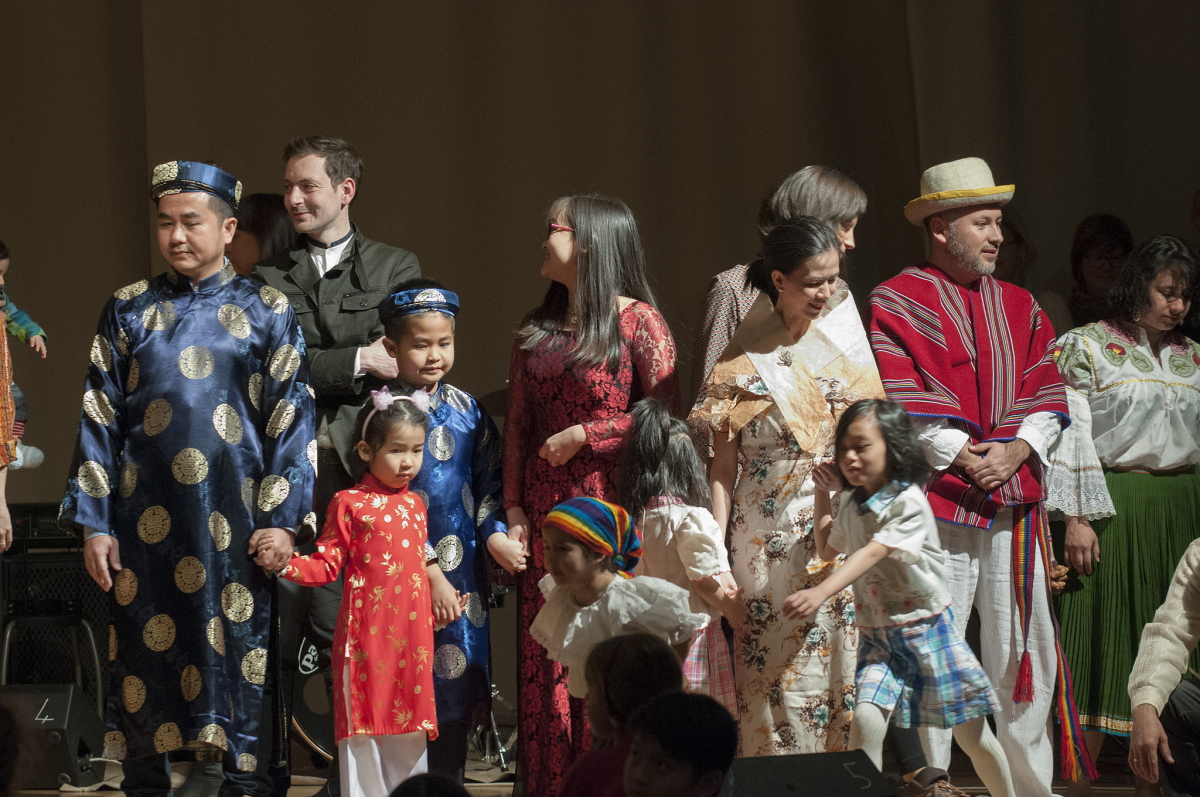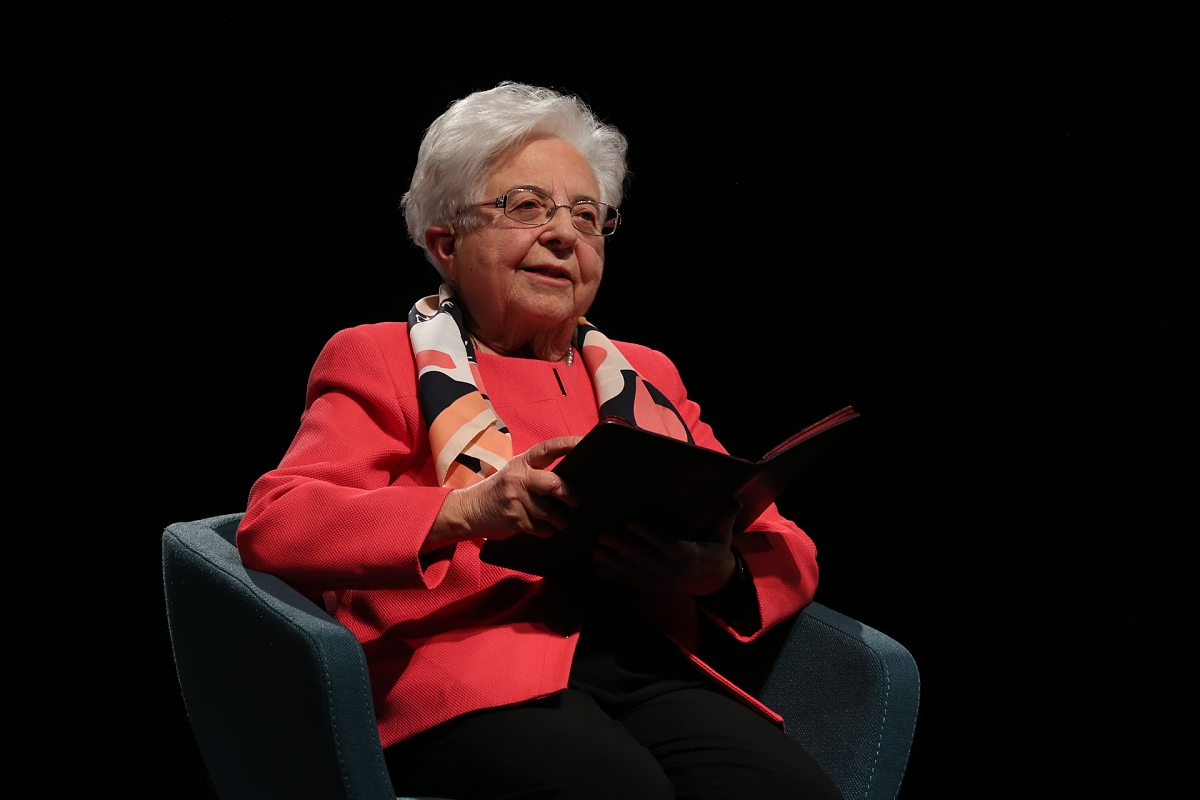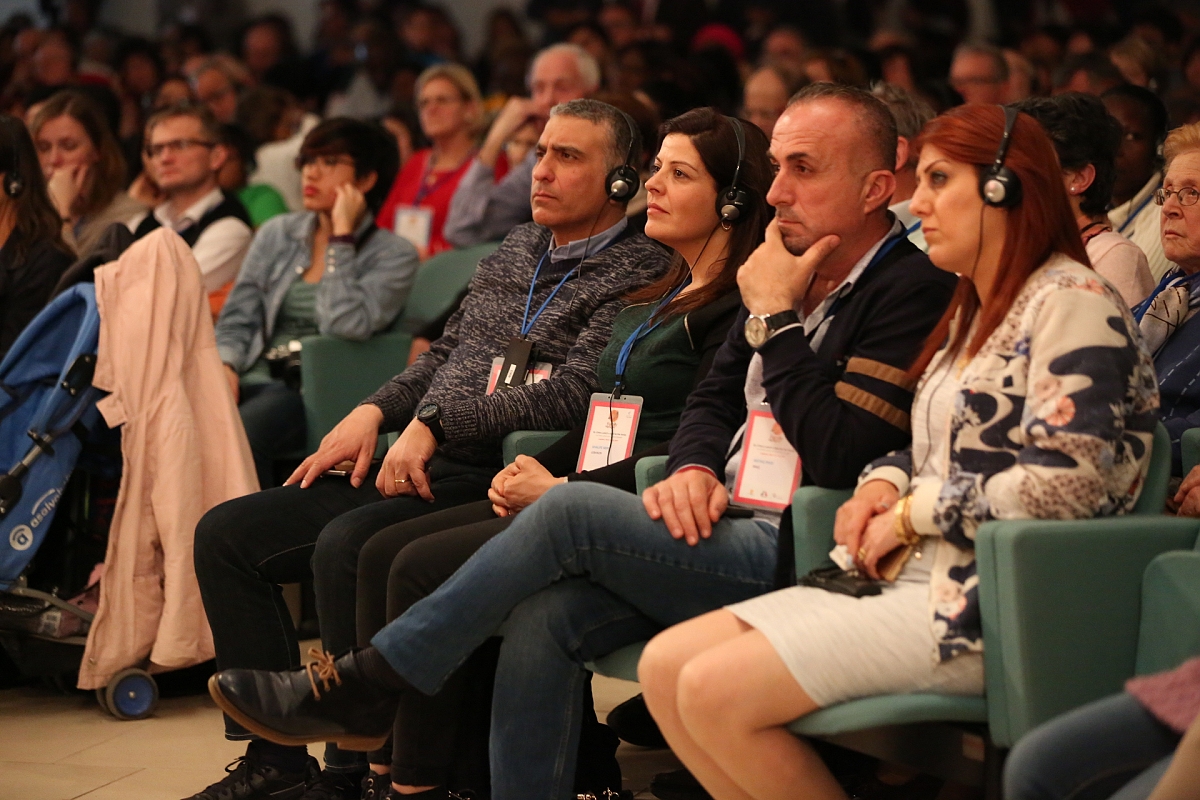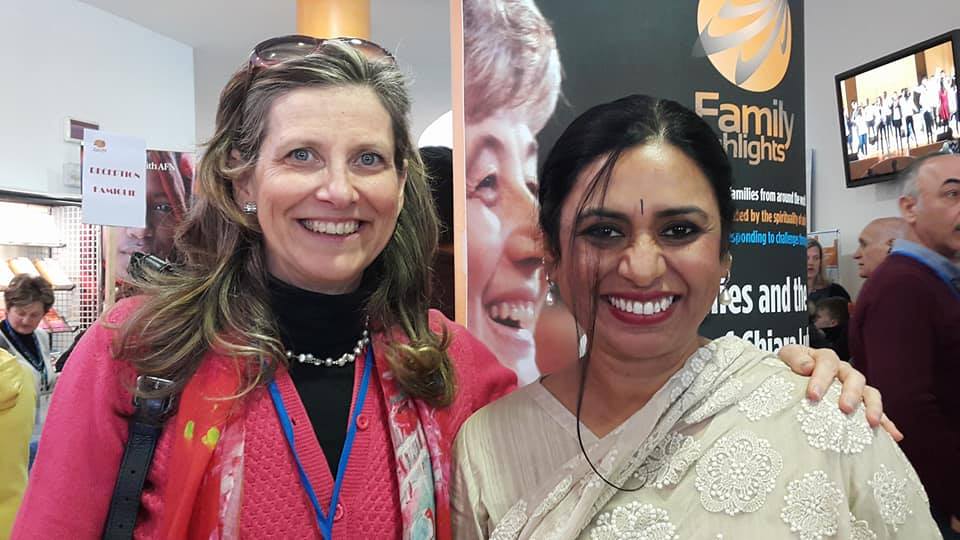
Family, school of reciprocity
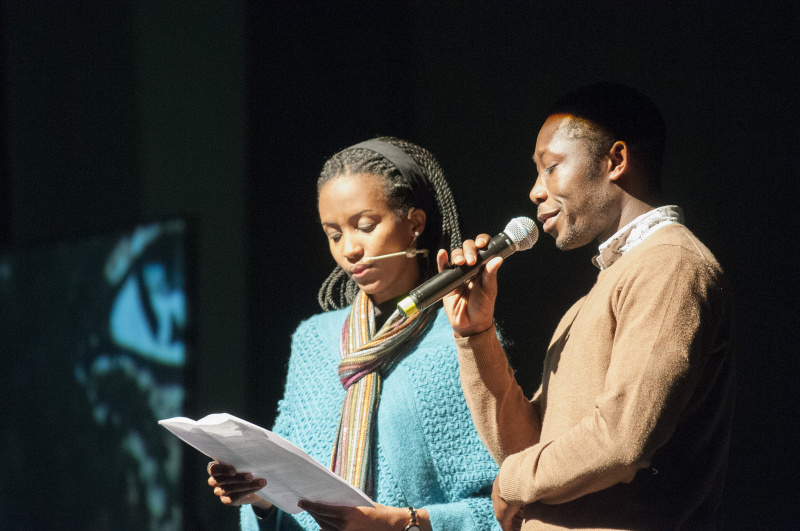 “Married life is like a boat,” said a family from Peru, “If you’re paddling by yourself, it’s tiring and you don’t get anywhere. Together you need to learn the art of reciprocity.” “We came because we feel the need to grow our family life and help others,” added a couple from Cameroon as they arrived at the FamilyHighlights meeting, which was held March 10-12 in Loppiano, Italy. The event, which marked the 50th anniversary of New Families, welcomed close to 1,000 families of different cultures and religions from 50 countries. It was connected to other gatherings worldwide held in memory of the ninth anniversary of Chiara Lubich’s passing. “Loving others as yourself, loving everyone, being the first to love, becoming one with others” –simple rules that the families of the international Loreto School emphasized as they welcomed everyone. This “art of loving” gives families the strength to renew themselves through trust, forgiveness, accountability, creativity, hospitality. These are seeds of communion that can even shed light on painful, challenging and traumatic situations. They show that “anger and distress do not have the last word,” said Gianni, who coordinates a group of 50 people who are separated. People’s stories and activities surfaced during the lively exchanges during the six workshops. One was for 150 children; other workshops were dedicated to couple dynamics in the various stages of life, educating children, and hospitality and solidarity with the disadvantaged in difficult situations. There were a few families from Syria, who found positive energy to face the fear and many difficulties caused by war. “That flower, which we attached at the end of the event, we’re also bringing it symbolically to other families and to everyone around us as a sign of fraternity and hope,” they said.
“Married life is like a boat,” said a family from Peru, “If you’re paddling by yourself, it’s tiring and you don’t get anywhere. Together you need to learn the art of reciprocity.” “We came because we feel the need to grow our family life and help others,” added a couple from Cameroon as they arrived at the FamilyHighlights meeting, which was held March 10-12 in Loppiano, Italy. The event, which marked the 50th anniversary of New Families, welcomed close to 1,000 families of different cultures and religions from 50 countries. It was connected to other gatherings worldwide held in memory of the ninth anniversary of Chiara Lubich’s passing. “Loving others as yourself, loving everyone, being the first to love, becoming one with others” –simple rules that the families of the international Loreto School emphasized as they welcomed everyone. This “art of loving” gives families the strength to renew themselves through trust, forgiveness, accountability, creativity, hospitality. These are seeds of communion that can even shed light on painful, challenging and traumatic situations. They show that “anger and distress do not have the last word,” said Gianni, who coordinates a group of 50 people who are separated. People’s stories and activities surfaced during the lively exchanges during the six workshops. One was for 150 children; other workshops were dedicated to couple dynamics in the various stages of life, educating children, and hospitality and solidarity with the disadvantaged in difficult situations. There were a few families from Syria, who found positive energy to face the fear and many difficulties caused by war. “That flower, which we attached at the end of the event, we’re also bringing it symbolically to other families and to everyone around us as a sign of fraternity and hope,” they said.  In her address, Focolare President Maria Voce invited those present to be mothers and fathers of humanity, personally contributing to “sustain and encourage universal fraternity.” Families, despite the imperfections and fragility that they share with the human condition, can offer the world a light and love that heals when they themselves have been renewed. Sharing from a number of groups, as well as the activities for couples, whether they were young, in crisis, separated and remarried, or widowed gave witness to the 50-year efforts of New Families on five continents. There were also projects and activities to support children and meet the needs of the most vulnerable. “Continue everything you are doing, and don’t get discouraged when it’s difficult or it seems like you’re all alone,” urged Voce. Families are called to respond to social issues, even by simply looking at the world through the eyes of a child, Dr. Vinu Aram explained. She is director at Shanti Ashram, with which the Focolare has had a close friendship and collaboration that has benefited many children and families in India through AFNonlus. “The effort that you are making here,” comments Fr. Paolo Gentili, who directs the Italian church’s family pastoral office, Ufficio Nazionale per la Pastorale della Famiglia, “contributes to build a church that is attentive to the good that the Spirit sows in the midst of weakness.” To do this is to “write Amoris Laetitia on the living pages of history.” After these many years, the need emerged to establish an advanced study center that is both international and interdisciplinary, a marriage of life and thought. This has begun as part of the Sophia University Institute, with the aim of deepening the understanding of family in the light of Chiara Lubich’s charism. “We need to move from the question, ‘Does someone love me?’ – our primal need for love –to ‘Am I loving someone?’ – which is the will to love,” said Professor Michele De Beni to a group of academics from various fields during FamilyHighlights. He is one of the coordinators of the study, “The pact of reciprocity in family life.” “The challenge of reciprocity,” he concluded, “is the founding premise of the group that, before it starts any research, it identifies with.” Giovanna Pieroni
In her address, Focolare President Maria Voce invited those present to be mothers and fathers of humanity, personally contributing to “sustain and encourage universal fraternity.” Families, despite the imperfections and fragility that they share with the human condition, can offer the world a light and love that heals when they themselves have been renewed. Sharing from a number of groups, as well as the activities for couples, whether they were young, in crisis, separated and remarried, or widowed gave witness to the 50-year efforts of New Families on five continents. There were also projects and activities to support children and meet the needs of the most vulnerable. “Continue everything you are doing, and don’t get discouraged when it’s difficult or it seems like you’re all alone,” urged Voce. Families are called to respond to social issues, even by simply looking at the world through the eyes of a child, Dr. Vinu Aram explained. She is director at Shanti Ashram, with which the Focolare has had a close friendship and collaboration that has benefited many children and families in India through AFNonlus. “The effort that you are making here,” comments Fr. Paolo Gentili, who directs the Italian church’s family pastoral office, Ufficio Nazionale per la Pastorale della Famiglia, “contributes to build a church that is attentive to the good that the Spirit sows in the midst of weakness.” To do this is to “write Amoris Laetitia on the living pages of history.” After these many years, the need emerged to establish an advanced study center that is both international and interdisciplinary, a marriage of life and thought. This has begun as part of the Sophia University Institute, with the aim of deepening the understanding of family in the light of Chiara Lubich’s charism. “We need to move from the question, ‘Does someone love me?’ – our primal need for love –to ‘Am I loving someone?’ – which is the will to love,” said Professor Michele De Beni to a group of academics from various fields during FamilyHighlights. He is one of the coordinators of the study, “The pact of reciprocity in family life.” “The challenge of reciprocity,” he concluded, “is the founding premise of the group that, before it starts any research, it identifies with.” Giovanna Pieroni
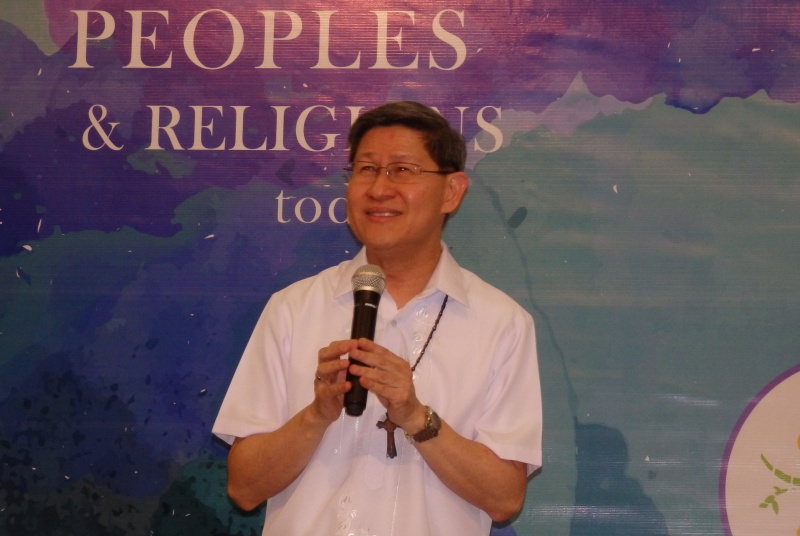
Philippines: School of interfaith dialogue
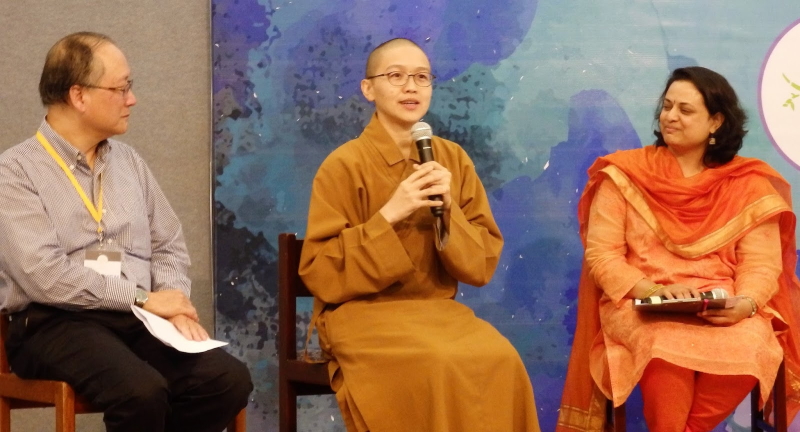 Lake Taal offers an incredibly beautiful panorama, and this year it seemed more so than usual. The temperature at the beginning of March was still perfect, and in the evenings a fresh breeze continued through the night until the mist rolled in around the time the sun rose. Every two years in this part of the Philippines (Tagaytay is a bit more than 40 km from Manila), there has been a course on interfaith dialogue, and this year the chosen title was “Harmony between peoples and religions today.” The School for Oriental Religions (SOR) was founded in 1982 by Chiara Lubich during her trip to Asia. Today the Mariapolis Pace in Tagaytay hosts a training center and various courses for young people, families, priests and seminarians. In addition to SOR, there are two social aid centers. Two hundred participants gathered at Tagaytay from March 2–5, from Pakistan, India, Myanmar, Thailand, Vietnam, China, Taiwan, Indonesia, Malaysia, Singapore, Korea, Japan and of course the Philippines. There were also some Europeans and South Americans. All saw the need for training in order to face the universal challenges that diversity brings. The course is planned to be repeated in participants’ respective countries.
Lake Taal offers an incredibly beautiful panorama, and this year it seemed more so than usual. The temperature at the beginning of March was still perfect, and in the evenings a fresh breeze continued through the night until the mist rolled in around the time the sun rose. Every two years in this part of the Philippines (Tagaytay is a bit more than 40 km from Manila), there has been a course on interfaith dialogue, and this year the chosen title was “Harmony between peoples and religions today.” The School for Oriental Religions (SOR) was founded in 1982 by Chiara Lubich during her trip to Asia. Today the Mariapolis Pace in Tagaytay hosts a training center and various courses for young people, families, priests and seminarians. In addition to SOR, there are two social aid centers. Two hundred participants gathered at Tagaytay from March 2–5, from Pakistan, India, Myanmar, Thailand, Vietnam, China, Taiwan, Indonesia, Malaysia, Singapore, Korea, Japan and of course the Philippines. There were also some Europeans and South Americans. All saw the need for training in order to face the universal challenges that diversity brings. The course is planned to be repeated in participants’ respective countries.  Cardinal Louis Antonio Tagle, archbishop of Manila and president of Caritas International, addressed the group. The Filipino cardinal opened the school by proposing the theme of harmony. Harmony: a typical Asian value. In order to achieve it, one needs to keep in mind that everything changes, and that as one moves forward, the more this change comes rapidly. “The only thing that doesn’t change is change itself,” Tagle affirmed. What is required, therefore, is to stay open and not have any fear of the unknown. In addition, one needs to know how to mediate the differences, accept opposing positions and the possibility of conflict, and to come through it greatly enriched by the differences. Tagle appealed to Catholics to play a lead role with active nonviolence. This is not about being weak, rather demonstrating that working for harmony requires people who have a prepared mind and heart for dialogue and diversity. The four days saw presentations of the successful dialogue between Christianity and the great Eastern religions in India, Thailand, Korea and Japan. Hindu-Christian dialogue was presented through life experiences, social collaboration, and shared projects between the Focolare and Gandhian movements in the south of India, including philosophical and theological reflections. Classic Hindu song was demonstrated and explained. All this occurred in an atmosphere of vital, spiritual clarity. Commonalities have surfaced after many years of dialogue, as well as differences, but these have not lessened the drive to take on dialogue’s challenges. This experience contributed to fulfilling the message of the Second Vatican Council: to build deep relationships with those of other faiths. A new way has begun that can contribute to social, political and global harmony. It is not an end in itself, but a step toward true fraternity.
Cardinal Louis Antonio Tagle, archbishop of Manila and president of Caritas International, addressed the group. The Filipino cardinal opened the school by proposing the theme of harmony. Harmony: a typical Asian value. In order to achieve it, one needs to keep in mind that everything changes, and that as one moves forward, the more this change comes rapidly. “The only thing that doesn’t change is change itself,” Tagle affirmed. What is required, therefore, is to stay open and not have any fear of the unknown. In addition, one needs to know how to mediate the differences, accept opposing positions and the possibility of conflict, and to come through it greatly enriched by the differences. Tagle appealed to Catholics to play a lead role with active nonviolence. This is not about being weak, rather demonstrating that working for harmony requires people who have a prepared mind and heart for dialogue and diversity. The four days saw presentations of the successful dialogue between Christianity and the great Eastern religions in India, Thailand, Korea and Japan. Hindu-Christian dialogue was presented through life experiences, social collaboration, and shared projects between the Focolare and Gandhian movements in the south of India, including philosophical and theological reflections. Classic Hindu song was demonstrated and explained. All this occurred in an atmosphere of vital, spiritual clarity. Commonalities have surfaced after many years of dialogue, as well as differences, but these have not lessened the drive to take on dialogue’s challenges. This experience contributed to fulfilling the message of the Second Vatican Council: to build deep relationships with those of other faiths. A new way has begun that can contribute to social, political and global harmony. It is not an end in itself, but a step toward true fraternity.
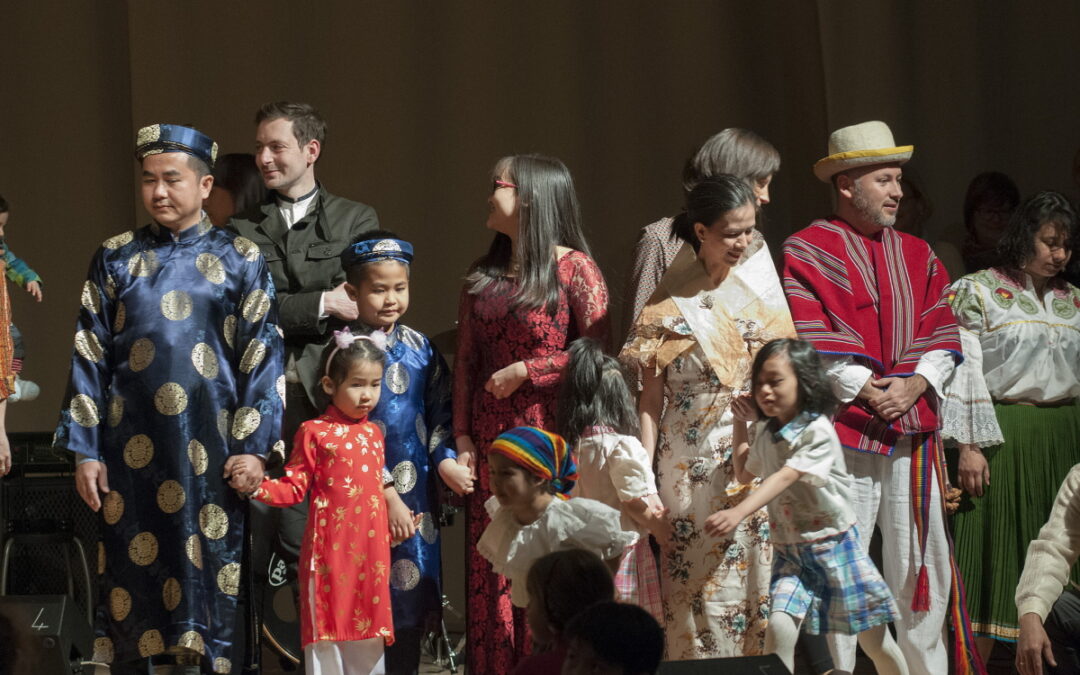
Chiara Lubich sheds light on family life
Copyright CSC Audiovisivi – Caris Mendes
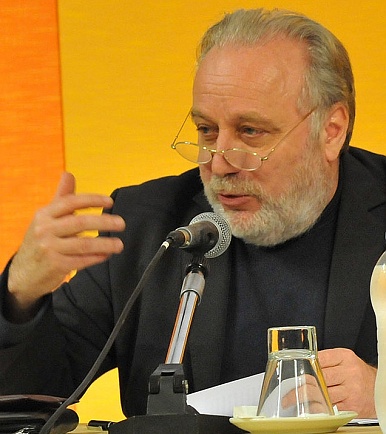
Pope Francis’s exhortation to “Go Forth”
 A missionary Church that lives the Gospel and shares its life with the people of God: this is the direction his pontificate is moving towards, expressed clearly and prophetically in the Evangelii Gaudium. “This regards the progressive and hard-fought awareness, Piero Coda explains, “in line with the Church’s way of being present in the world, and its mission which has to be, from top to bottom, measured on Jesus’s style.” Four years after his election, we still have not recovered from the surprise his words, style and gestures arouse in us. We find it hard to realize what is happening. With radical clarity, he evidently inspires his ministry to live the “sine glossa” – with comments and compromises. We know that the formula is that of Francis of Assisi, which undoubtedly is why Jorge Maria Bergoglio felt God’s inspiration to take his name in this particular moment of the world’s history: to declare the spirit with which he wants to animate his service as the Bishop of Rome. He says this formula orders us not to measure the Gospel according to our own yardstick but to open our hearts and minds to the endless measures set by the Gospel. But isn’t this what the Church of all time is called to? So what novelty is there? To tell the truth, in every epoch conversion and reform assume a tone and pursue a path which, being the same as always, are those and only those that respond to the queries and wounds of the time we are called to live. If the conversion we were asked of yesterday, is in a sense, the very same as that which we are called to today, and yet today, it is something else compared to yesterday under the profile of its historical expression and implementation, it is because we are called to respond to God’s voice that reminds us precisely of those words of Jesus which the Spirit wishes to highlight and make us concretise now. It will be a response to the challenges and wounds of the present. It is a matter of a progressive and hard-fought awareness, according to which the style (that is, the content and form together) of the Church’s presence in the world and its mission have precisely been measured from top to bottom, according to the style of Jesus. I was really deeply impressed by the words which Romana Guarneri with her distinctive sense of history, said to me in a feeble voice just before she died: “Christianity still has to blossom.” I think that this affirmation can be interpreted in the sense that the time has come, in which from the roots of faith in Christ, a fresh, innovative flower can and must bloom, and which can amaze us again with its rare beauty, and give us new life. What in the end does 2,000 years of history mean? Has not Christianity expressed itself only in the existence and philosophy of Europe and the West? Of course, the expressions have been providential and precious, but other than definitive and absolute. In all that Pope Francis has put in motion in the Church, the real issue at stake is huge. It may even be decisive for the Church in the unprecedented season awaiting it. Vatican II was not only a point of arrival, but more of a point of departure. None of the extraordinary heritage of Tradition has been lost, but all has to be reset in a disarmed listening to the Holy Spirit’s inspiration today. What God expects of the Church today – he said, not by chance on the 50th anniversary of the institution of the Bishops’ Synod, is enclosed in one word: synod. It is a walking together of men, women, youths, adults, and the elderly. It includes the various vocations and charisms in the Church, and different Churches, cultures religions, and visions of the world. All are involved – no one is excluded, starting from those who in some way are discarded. The mystical sense of “we” is the perfume, truth and measure of justice of a Church that “goes forth.” It is the yeast of that new cultural paradigm of that urgently postulated and invoked epochal change we are called to be the protagonists of, under penalty of the collapse and disintegration of the human adventure. Four years from his election we can say with simplicity, conviction and gratitude: Pope Francis is a gift for all of us, not only for the Catholics. This is because he urges us to become men and women that as the people of God, choose the morning star of the pathway, and as our existential and liberating code, nothing else but the beautiful, good, and joyful news of the Gospel. It will light up the fire – today as 2000 years ago – in the heart of the world.
A missionary Church that lives the Gospel and shares its life with the people of God: this is the direction his pontificate is moving towards, expressed clearly and prophetically in the Evangelii Gaudium. “This regards the progressive and hard-fought awareness, Piero Coda explains, “in line with the Church’s way of being present in the world, and its mission which has to be, from top to bottom, measured on Jesus’s style.” Four years after his election, we still have not recovered from the surprise his words, style and gestures arouse in us. We find it hard to realize what is happening. With radical clarity, he evidently inspires his ministry to live the “sine glossa” – with comments and compromises. We know that the formula is that of Francis of Assisi, which undoubtedly is why Jorge Maria Bergoglio felt God’s inspiration to take his name in this particular moment of the world’s history: to declare the spirit with which he wants to animate his service as the Bishop of Rome. He says this formula orders us not to measure the Gospel according to our own yardstick but to open our hearts and minds to the endless measures set by the Gospel. But isn’t this what the Church of all time is called to? So what novelty is there? To tell the truth, in every epoch conversion and reform assume a tone and pursue a path which, being the same as always, are those and only those that respond to the queries and wounds of the time we are called to live. If the conversion we were asked of yesterday, is in a sense, the very same as that which we are called to today, and yet today, it is something else compared to yesterday under the profile of its historical expression and implementation, it is because we are called to respond to God’s voice that reminds us precisely of those words of Jesus which the Spirit wishes to highlight and make us concretise now. It will be a response to the challenges and wounds of the present. It is a matter of a progressive and hard-fought awareness, according to which the style (that is, the content and form together) of the Church’s presence in the world and its mission have precisely been measured from top to bottom, according to the style of Jesus. I was really deeply impressed by the words which Romana Guarneri with her distinctive sense of history, said to me in a feeble voice just before she died: “Christianity still has to blossom.” I think that this affirmation can be interpreted in the sense that the time has come, in which from the roots of faith in Christ, a fresh, innovative flower can and must bloom, and which can amaze us again with its rare beauty, and give us new life. What in the end does 2,000 years of history mean? Has not Christianity expressed itself only in the existence and philosophy of Europe and the West? Of course, the expressions have been providential and precious, but other than definitive and absolute. In all that Pope Francis has put in motion in the Church, the real issue at stake is huge. It may even be decisive for the Church in the unprecedented season awaiting it. Vatican II was not only a point of arrival, but more of a point of departure. None of the extraordinary heritage of Tradition has been lost, but all has to be reset in a disarmed listening to the Holy Spirit’s inspiration today. What God expects of the Church today – he said, not by chance on the 50th anniversary of the institution of the Bishops’ Synod, is enclosed in one word: synod. It is a walking together of men, women, youths, adults, and the elderly. It includes the various vocations and charisms in the Church, and different Churches, cultures religions, and visions of the world. All are involved – no one is excluded, starting from those who in some way are discarded. The mystical sense of “we” is the perfume, truth and measure of justice of a Church that “goes forth.” It is the yeast of that new cultural paradigm of that urgently postulated and invoked epochal change we are called to be the protagonists of, under penalty of the collapse and disintegration of the human adventure. Four years from his election we can say with simplicity, conviction and gratitude: Pope Francis is a gift for all of us, not only for the Catholics. This is because he urges us to become men and women that as the people of God, choose the morning star of the pathway, and as our existential and liberating code, nothing else but the beautiful, good, and joyful news of the Gospel. It will light up the fire – today as 2000 years ago – in the heart of the world.
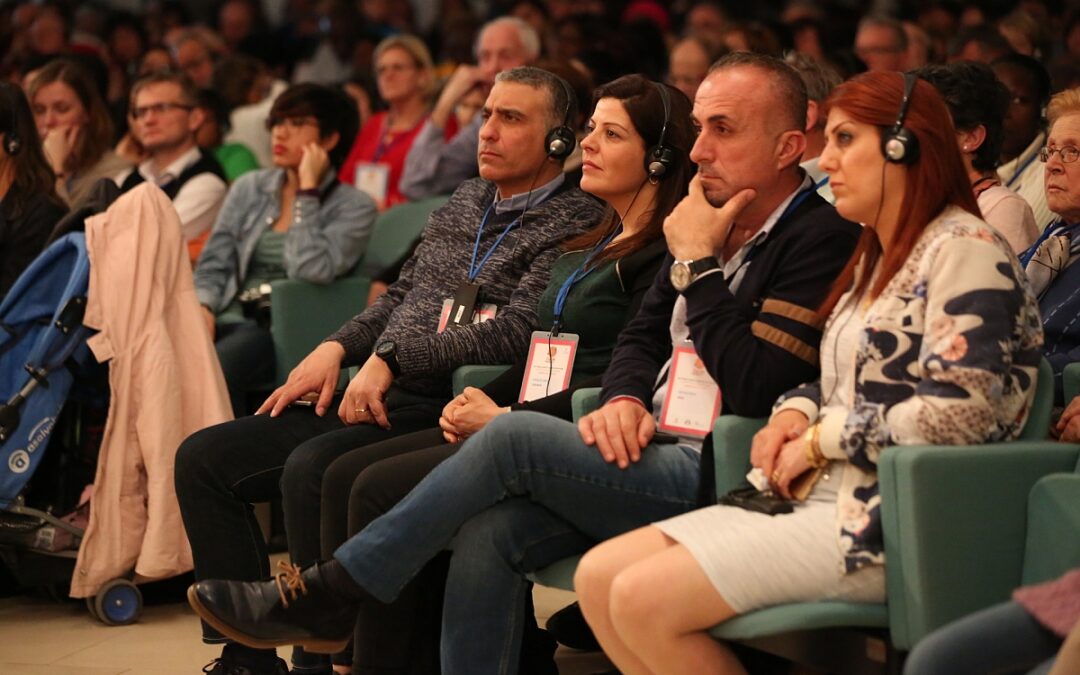
Maria Voce: The family – a creative resource
“This evening I invite you to dream with me about a different world, the one we would like to live in” Maria Voce said, having heard the stories and commitments of many families from the stage. They seek to live the charism of Chiara Lubich, in their daily lives. It is a spirituality that “encourages us to look at the world and history from a different point of view. It helps us understand the bond that connects us with the whole of humankind, and which is not merely personal. This bond embraces the whole of our being, our affections, our relationships, our weaknesses, emotions, sufferings, commitments and dreams.” She reminded us that: “When Chiara founded the New Families Movement on the 19th July 1967, she said: “… it is important that you (…) have in your own family life an experience you can share with others“[1], (to be) another Jesus: Jesus who looks at the world, at the crowds, and has pity on them. Because within this section of the world … I place upon your shoulders those most broken, most like Him forsaken.[2] Today I believe we can say that this invitation to families is being made once more, to every family. “What kind of family can create a world imbued with brotherhood?” Maria Voce asked. “Only families renewed from within in this way, despite being weak and imperfect, as we all are, can give the world the healing light and love it needs, so that society can find genuine models to follow.” She invited them to do this “By sharing material and spiritual goods, freely”, by “accepting others for what they are, caring for them, living alongside one another happily”, “handing on values from one generation to the next”, and practising “the forgiveness and correction which are so necessary for human development”, and “meeting the needs of those in need” those nearby. After stressing the essential tasks of families and their commitment in the New Families Movement, she mentioned some concrete examples: “In a town near Chicago, Carole realised that other families struggled with the same problems she faced in caring for her severely disabled son David. She organised a series of activities bringing young disabled people together, engaging many families from her part of the town and involving the town council, which was then awarded a prize for social development.” She ended saying: “t might seem a dream. These experiences show it is already a reality, which might be very small or just beginning, but which contain the overwhelming power of life.” Read full text ___________________________________________ [1] C. LUBICH, talk given to the first school of married focolarini on the occasion of founding the New Famililes Movement, Rocca di Papa, Italy, 19.7.1967, Trascription. [2] Ibid.Domenico Mangano
Dated March 9, 2017 the Official Edict from the Bishop of Albano, Italy, Marcello Semeraro: “His authentic Christian witness is a constant invitation to the collective holiness, which finds maximum expression in reciprocal assistance while following the same path of holiness. Becoming saints out of love for one’s neighbours.” The Volunteers of God of the Focolare Moviment joyfully welcome the bishop’s initiative. Read a short biography here Contact: postulazionedomenicomangano@focolare.org
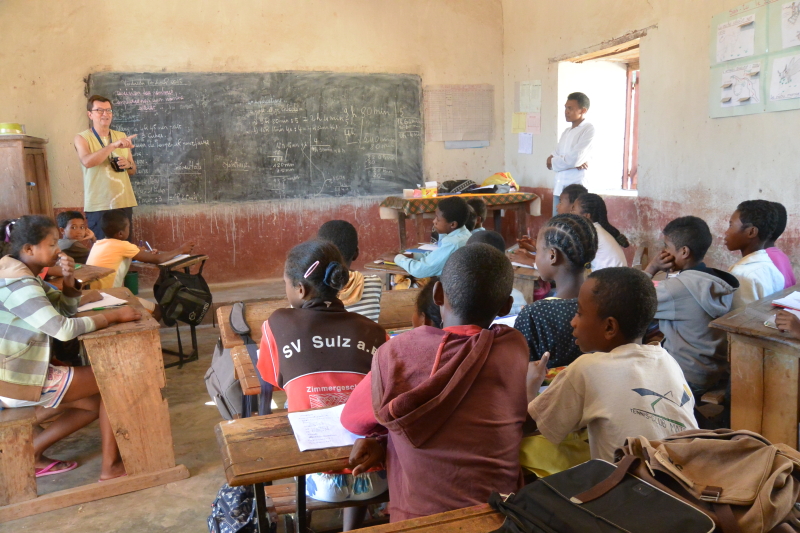
Families: Eric and Lut’s dream
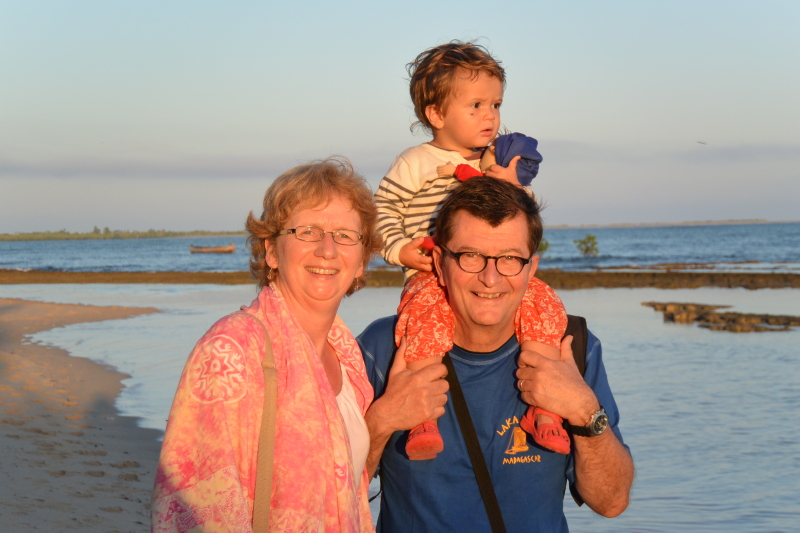 The long-awaited time for retirement arrives for Eric, who lives in Belgium and has spent 37 years teaching at an elementary school. After working for a living with the children, Eric asks what could be done for those who did not receive an education, for those who live in difficult situations and in distant lands. After all, all children are equal, have the same curious eyes and the same infectious laugh. This is how, together with his wife Lut, he decides to commit his free time to solidarity action. Eric, already a supporter of a child, began to promote the AFNonlus programs for long-distance support. With the help of the youngest of his daughters, Maria-Laetitia, he involved friends and acquaintances, helping to make more alive in each one the need to also donate a small sum for a noble cause. “For us, as for many people, the situation of many children in the world is unbearable: they are the first victims of all violence and poverty,” says Eric. The couple receive many opportunities and experiences for thought: a young father from Romania said that thanks to long-distance support he was able to finish his studies, which have allowed him to get a job and start a family. A woman who has lived for many years in Congo, being in contact with the Petite Flamme project has been able experience first-hand the help that long-distance support offers children. These testimonials feed in Eric and Lut the certainty of having committed themselves to something big.
The long-awaited time for retirement arrives for Eric, who lives in Belgium and has spent 37 years teaching at an elementary school. After working for a living with the children, Eric asks what could be done for those who did not receive an education, for those who live in difficult situations and in distant lands. After all, all children are equal, have the same curious eyes and the same infectious laugh. This is how, together with his wife Lut, he decides to commit his free time to solidarity action. Eric, already a supporter of a child, began to promote the AFNonlus programs for long-distance support. With the help of the youngest of his daughters, Maria-Laetitia, he involved friends and acquaintances, helping to make more alive in each one the need to also donate a small sum for a noble cause. “For us, as for many people, the situation of many children in the world is unbearable: they are the first victims of all violence and poverty,” says Eric. The couple receive many opportunities and experiences for thought: a young father from Romania said that thanks to long-distance support he was able to finish his studies, which have allowed him to get a job and start a family. A woman who has lived for many years in Congo, being in contact with the Petite Flamme project has been able experience first-hand the help that long-distance support offers children. These testimonials feed in Eric and Lut the certainty of having committed themselves to something big.  “Our dream,” says Eric, “was to find at least 10 people over the course of 2016 who would take the step of supporting a child. It seemed like a mountain because in three years we’d found only two supporters (namely us and my father!).” But clearly the commitment and time spent promoting the news from the various programmes paid off. A couple decides to support a Haitian child and to continue the action of solidarity. Even Eric and Lut’s children want to do their bit. As well a man with a friend of his, a nephew who lives in Switzerland, glad to be able to ”do something for humanity”, a young couple of newlyweds, a businessman who wants to support a child with his company, a young dad, and Lut’s parents who want to support a child while living in a nursing home. And so on, so many beautiful experiences around this kind of support! The projects for disadvantaged children around the world are moving forward thanks to supporters, their sensitivity and their support. In addition to Eric and Lut, we also find Enzo and Fiorenza, whose support has accompanied Jessica, a Brazilian girl, for most of her life. But assuming a long- distance support means above all to create a bond with the child, a thread of solidarity that runs through the world to connect distant countries. That’s why now as an adult Jessica wanted to contact her supporters for Christmas, offering them the best gift that can be placed under the tree: the gratitude for a life redeemed from poverty. Source: AFNonlus – Spazio Famiglia
“Our dream,” says Eric, “was to find at least 10 people over the course of 2016 who would take the step of supporting a child. It seemed like a mountain because in three years we’d found only two supporters (namely us and my father!).” But clearly the commitment and time spent promoting the news from the various programmes paid off. A couple decides to support a Haitian child and to continue the action of solidarity. Even Eric and Lut’s children want to do their bit. As well a man with a friend of his, a nephew who lives in Switzerland, glad to be able to ”do something for humanity”, a young couple of newlyweds, a businessman who wants to support a child with his company, a young dad, and Lut’s parents who want to support a child while living in a nursing home. And so on, so many beautiful experiences around this kind of support! The projects for disadvantaged children around the world are moving forward thanks to supporters, their sensitivity and their support. In addition to Eric and Lut, we also find Enzo and Fiorenza, whose support has accompanied Jessica, a Brazilian girl, for most of her life. But assuming a long- distance support means above all to create a bond with the child, a thread of solidarity that runs through the world to connect distant countries. That’s why now as an adult Jessica wanted to contact her supporters for Christmas, offering them the best gift that can be placed under the tree: the gratitude for a life redeemed from poverty. Source: AFNonlus – Spazio Famiglia

The EoC and One Entrepreneur’s Story
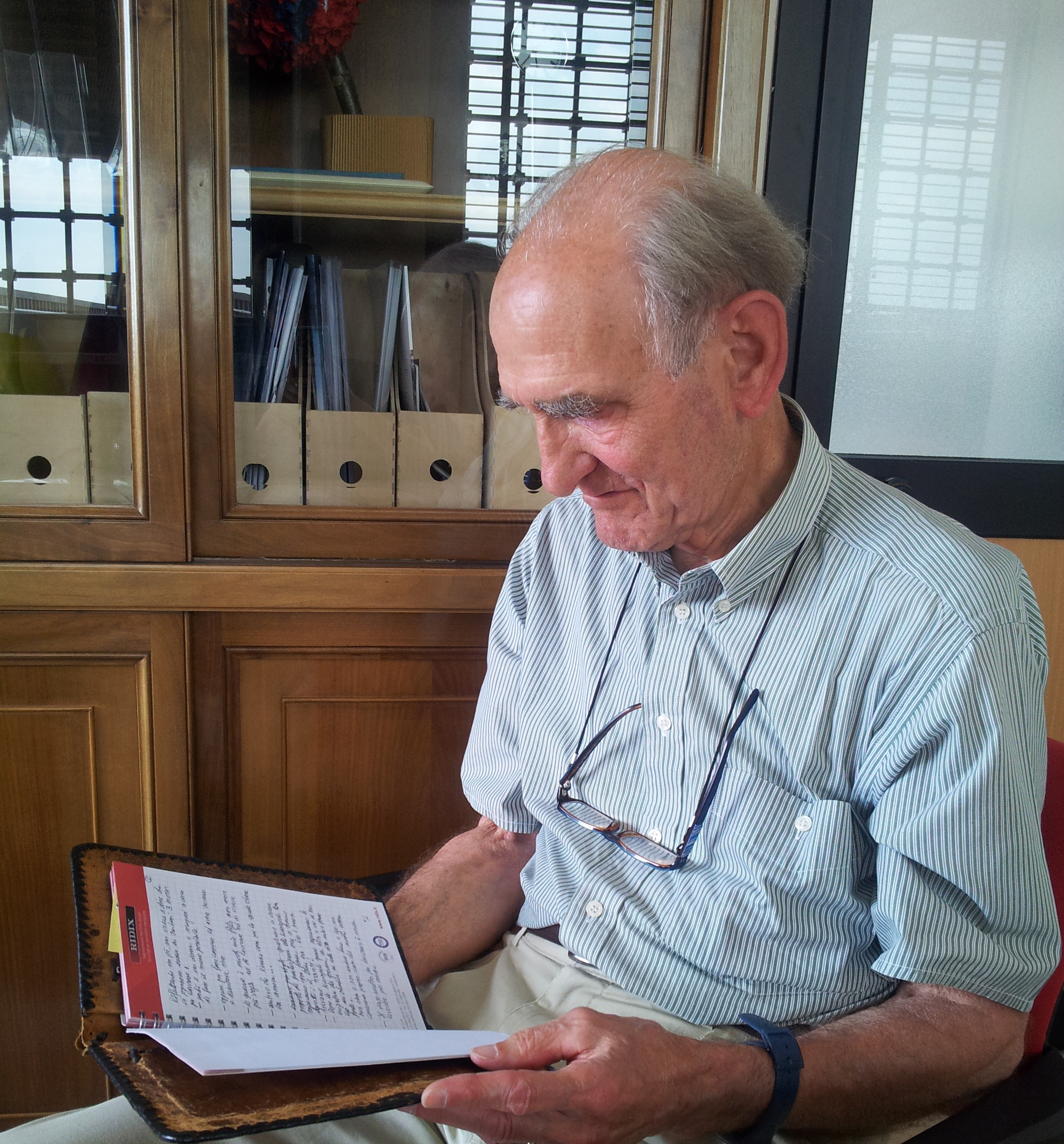 While waiting to meet Pope Francis in Paul VI Hall the anticipation of the 1200 members of the Economy of Communion (EoC) was calmed by several testimonies from entrepreneurs including Clem Fritschi who began like this: “Mine is not the story of a successful man of business, but a love story. After finishing my studies in Switzerland I worked as a warehouseman in London, to learn English. That’s where I met Margherita. We fell in love and, since she’s from Turin, I decided to find work in Italy. Two years later we got married and had two children. All of a sudden the company I was working for decided to close down. Then a few colleagues and I put together our settlements in order to keep the place going.” That’s how Ridix began, a company that has been offering cutting-edge products on the Italian market in the field of precision engineering since 1969.
While waiting to meet Pope Francis in Paul VI Hall the anticipation of the 1200 members of the Economy of Communion (EoC) was calmed by several testimonies from entrepreneurs including Clem Fritschi who began like this: “Mine is not the story of a successful man of business, but a love story. After finishing my studies in Switzerland I worked as a warehouseman in London, to learn English. That’s where I met Margherita. We fell in love and, since she’s from Turin, I decided to find work in Italy. Two years later we got married and had two children. All of a sudden the company I was working for decided to close down. Then a few colleagues and I put together our settlements in order to keep the place going.” That’s how Ridix began, a company that has been offering cutting-edge products on the Italian market in the field of precision engineering since 1969.  “In 1974 my family and I took part in a Focolare Meeting in Bergamo, Italy. It wasn’t a happy time, we had just lost our first son10 years old, in an accident. The encounter with the spirituality of unity was like a cure-all for us, to the point that even amidst our tears Margherita and I said to each other that we had met God-Love. We went home with only one word in mind, the verb: LOVE. Love everyone, love even at work. One of the young men that I met in Bergamo asked if there would be a position for him in the business I started. That’s how Ugo, then Paolo, and then Michele got on board. All three became associates. The company slogan is: “Seek first the Kingdom of God and his riteousness, and the rest will be given to you as well.” All of us want our relationship to be deep and sincere. We allow each other to make mistakes and to argue, but to experience the presence of God we also have to hurry ourselves to recompose unity with one another. The success is overwhelming: Today there are 9 associates and 70 collaborators, many highly qualified in selling, contract signing, commissioning, maintenance and management. We have an annual turnover of more than 30 million Euros. Loving one another and trying to love everyone, even our enemies: that’s the success of Ridix that I will try to describe with a few short phrases.
“In 1974 my family and I took part in a Focolare Meeting in Bergamo, Italy. It wasn’t a happy time, we had just lost our first son10 years old, in an accident. The encounter with the spirituality of unity was like a cure-all for us, to the point that even amidst our tears Margherita and I said to each other that we had met God-Love. We went home with only one word in mind, the verb: LOVE. Love everyone, love even at work. One of the young men that I met in Bergamo asked if there would be a position for him in the business I started. That’s how Ugo, then Paolo, and then Michele got on board. All three became associates. The company slogan is: “Seek first the Kingdom of God and his riteousness, and the rest will be given to you as well.” All of us want our relationship to be deep and sincere. We allow each other to make mistakes and to argue, but to experience the presence of God we also have to hurry ourselves to recompose unity with one another. The success is overwhelming: Today there are 9 associates and 70 collaborators, many highly qualified in selling, contract signing, commissioning, maintenance and management. We have an annual turnover of more than 30 million Euros. Loving one another and trying to love everyone, even our enemies: that’s the success of Ridix that I will try to describe with a few short phrases.
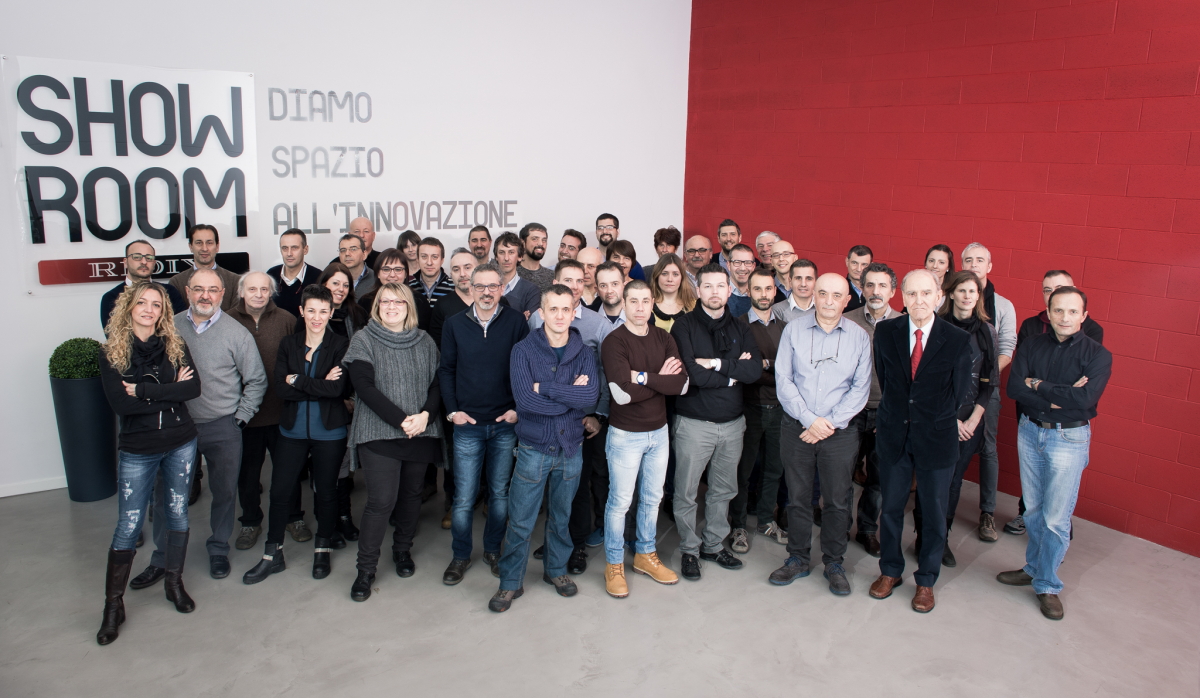 Inclusion of people affected by addiction or in difficult relationship problems, people from immimgrant backgrounds and from poor countries.
Inclusion of people affected by addiction or in difficult relationship problems, people from immimgrant backgrounds and from poor countries.- Stable employment opportunities for young people.
- Overcoming moments of crisis through a 20% reduction in everyone’s salary, partners included, so that jobs don’t have to be lost. The sense of belonging that is generated with this practice always turns out to be a factor of success.
- Following the takeover of a client by a multinational, there was a loss of 20% of the annual turnover. Because of a totally unforseen occurance, in one week the entire amount was recovered without losing a single employee.
- In seemingly irresovlable situations, the correct inspiration arrived at just the right moment to simplify everything and overcome the difficulty.
- The ability to support and carry out new entrepreneurial initiatives.
One part of the profit is donated to the poor. Thanks to this sharing, Muslim teachers on the outskirts of Tangeri, Morocco opened a kindergarten in a garage that allowed 40 children to be ready for primary school. The secret to our success? Communion. Which means transparency, sincerity, truth even when it is hard to say, devoting time to building positive relationships. The “promised land” we’re all heading for is a company where everyone is happy. Happy employees because the company is healty and the atmosphere collaborative. Happy clients because of just relationship betewen quality and product pricing, and purchasing services. Happy providers, because of long and prolific collaboration. We may be tired at the end of a day, but we’re happy and satisfied because we’ve done our job well.
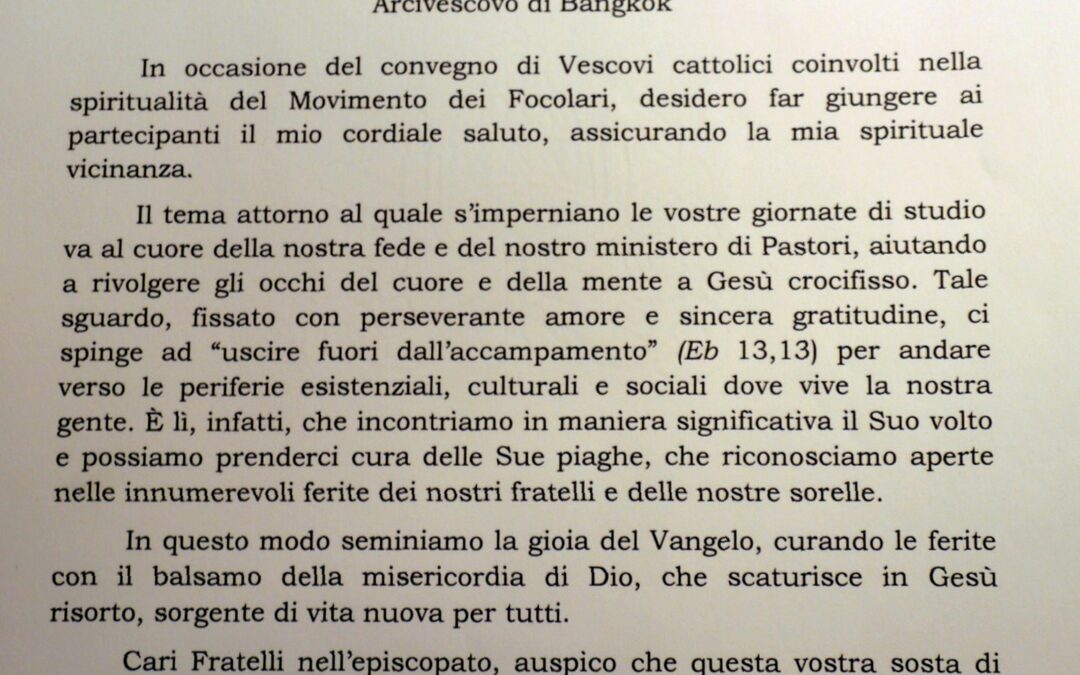
Pope Francis to the Bishop Friends of the Focolare
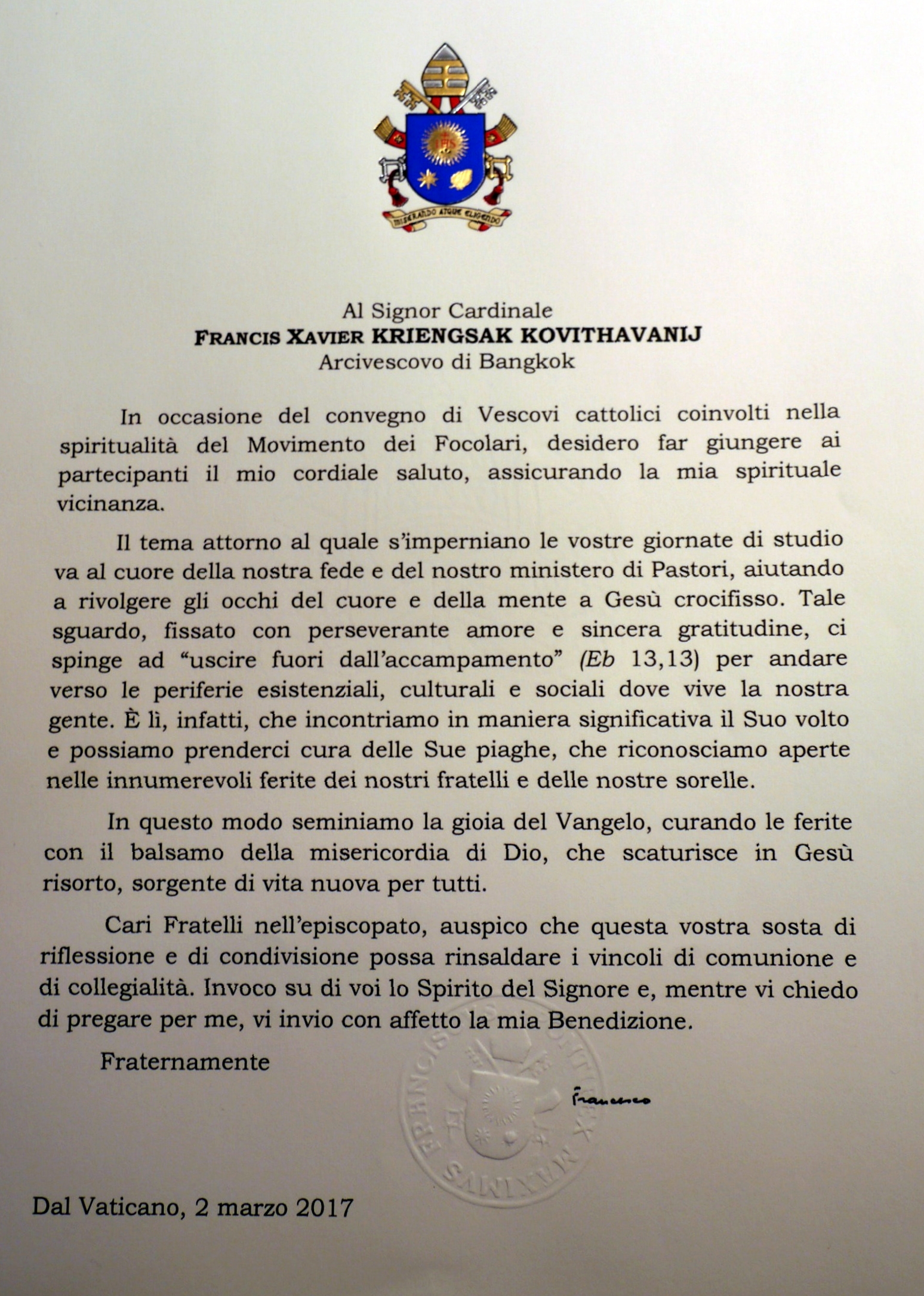 The conference of Bishop Friends of the Focolare, which is currently underway at the Mariapolis Centre of Castel Gandolfo, is titled: “If the world only knew him…” referring to the mystery of the abandonment of Jesus on the cross as the key to encounter among cultures. In a hand-signed message Pope Francis wished to express his closeness and encouragement to entering more deeply into this topic that urges us to “go towards the existential, cultural and social peripheries” and to “strengthen the bonds of communion and collegiality.” The message, which is addressed to the moderator of the gathering, Archbishop Francis X. Kovithavanij, had great impact and aroused much gratitude among the bishops. _____________________________________
The conference of Bishop Friends of the Focolare, which is currently underway at the Mariapolis Centre of Castel Gandolfo, is titled: “If the world only knew him…” referring to the mystery of the abandonment of Jesus on the cross as the key to encounter among cultures. In a hand-signed message Pope Francis wished to express his closeness and encouragement to entering more deeply into this topic that urges us to “go towards the existential, cultural and social peripheries” and to “strengthen the bonds of communion and collegiality.” The message, which is addressed to the moderator of the gathering, Archbishop Francis X. Kovithavanij, had great impact and aroused much gratitude among the bishops. _____________________________________
To Cardinal
FRANCIS XAVIER KRIENGSAK KOVITHAVANIJ
Archbishop of Bangkok
“On the occasion of the meeting of Catholic Bishops engaged with the spirituality of the Focolare Movement, I wish to extend my cordial greetings to all of you, assuring you of my spiritual closeness. The theme around which your days together revolve goes to the very heart of our faith and ministry as pastors, helping to turn the eyes of the heart and of the mind to Jesus crucified. This gaze, fixed with persevering love and sincere gratitude, urges us to “go to him outside the camp” (Heb 13:13), to the existential, cultural and social peripheries where our people live. It is there, in fact, that we meet His face in a way that is significant, and take care of His wounds which we find gaping in the countless wounds of our brothers and sisters. In this way we will sow the joy of the Gospel, caring for the wounds with the balm of God’s mercy which flows from the Risen Jesus, who is the source of life for everybody. Dear Brothers in the episcopate, I wish you that this pause for reflection and sharing may strengthen the bonds of communion and collegiality. I invoke the Spirit of the Lord upon you and, as I ask you to pray for me, I affectionately extend my Blessing to you.”
Fraternally,
Francis
Vatican, 2 March 2017

